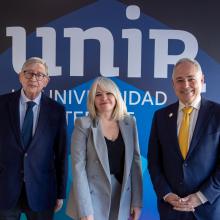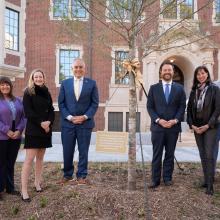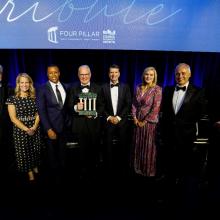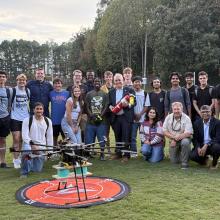
Magnus Carlsen is one of the greatest chess players in history. This Norwegian from Tønsberg holds the record for the highest Elo rating ever achieved by a human: 2,882 points. Yet today, any beginner armed with nothing more than an iPhone or Android and a free, open-source app like Stockfish 16 (rated over 3,700 Elo) would beat him 100% of the time — an insurmountable gap that makes human victory against the machine statistically impossible.

On the morning of Nov. 13, the Institute community gathered at the newly renovated D.M. Smith Building to celebrate the naming of our School of Public Policy after two of the most beloved Georgians in our state’s history: Jimmy and Rosalynn Carter. In a packed, standing-room-only auditorium ...
Georgia Tech cannot continue its remarkable trajectory of growth — in enrollment, research, innovation, and impact — without a strong culture of ethical conduct. That’s why it is important that we keep reminding each other that we need to earn and nurture the public trust every day — and that’s why, every year, we use an entire week to double down on the message!

Last night, I was invited to speak at the Four Pillar Tribute Award ceremony honoring Tommy Holder (IMGT 1979), chair and CEO of Holder Construction Company and former chair of the Georgia Tech Foundation board of trustees. Here’s what I had to say about my friend and fellow alumnus.

How Vertically Integrated Project Teams Like Georgia Tech’s FlameJackets Are Shaping Tomorrow’s Problem Solvers.
At Georgia Tech, we’re driven by one mission — to develop leaders who advance technology and improve the human condition. Technology matters if it helps us live better lives. Improving the human condition is not just about engineering better systems or inventing smarter tools. It’s also about understanding and nurturing what makes us human and what makes us thrive: our creativity, our emotions, our capacity to imagine and connect.

At Georgia Tech, we believe in making a top-ranked education accessible, affordable, scalable, and aligned with workforce needs. This belief was at the heart of my keynote at the Open edX Conference in Paris earlier this summer. In “Rethinking the University: Access, Affordability, and Excellence at Scale,” I shared how Georgia Tech is redefining what it means to serve learners in the 21st century through our suite of world-class online master's programs.

Earlier this month, I had the pleasure of going back on tour to see the Institute's impact in action throughout Georgia and the greater region. Over the course of three days, I joined fellow Institute leaders on a journey that took us across 775 miles to attend 13 events in seven towns. Everywhere we went, the impact of Georgia Tech alumni, students, and researchers on transforming and improving the state was on full display.

I could not have been more pleased to recognize María Corina Machado, recipient of the 2025 Ivan Allen Prize for Social Courage, during our Feb. 14 celebration event.
